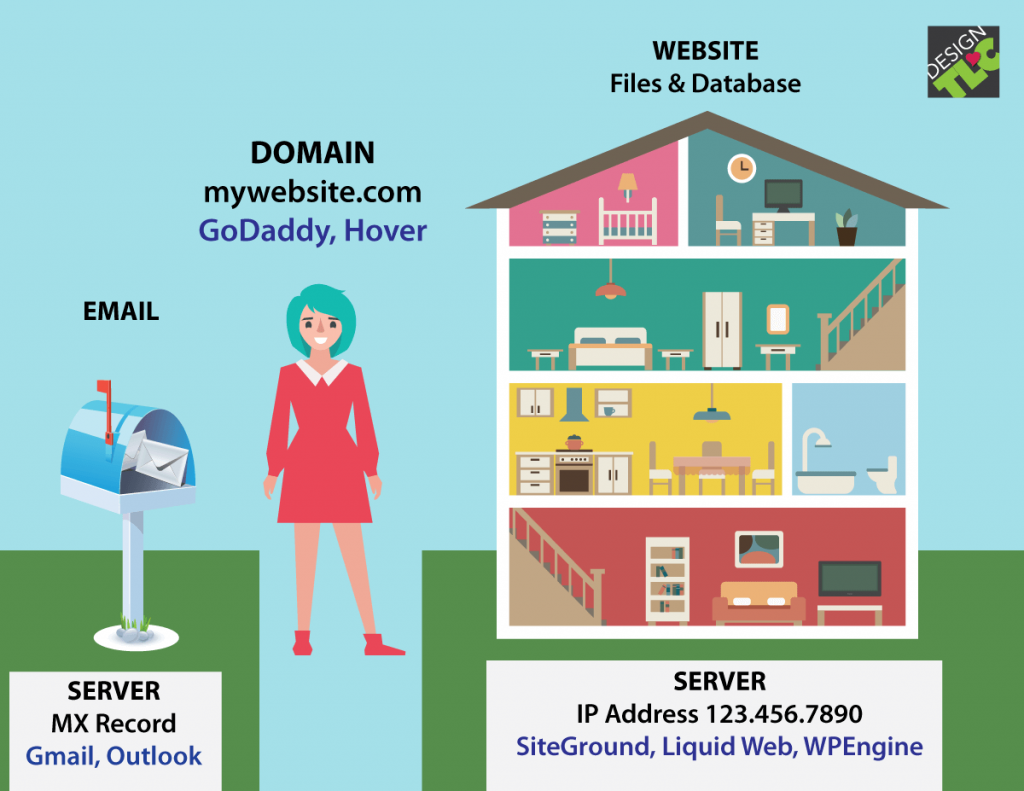What is the Difference Between Domain and Website Hosting?
The concept of “hosting” can be IS confusing. A client recently asked us if they should cancel their domain hosting account because we moved their website hosting to a different provider. The answer is no! You need both. Confusing? Yes!
Here is a basic overview of DOMAIN HOSTING (also called “Registration/Registrar”) and WEBSITE HOSTING. You can read about other website terminology here.
Domain names and web hosting are two different components of a website. However, they work together to make websites possible. Email is also related to your domain.

DOMAIN HOSTING
You domain name is your identity online. A domain is not a website, it’s your name.
A central registration agency, called Internet Corporation for Names and Numbers ICANN controls domains or “urls.” This agency keeps a list of all domain names that exist, and who leases them. You cannot register your domain yourself with ICANN. ICANN actually leases domains - you don’t ever own it completely, and you can lose it if you don’t renew it. You need to use a “registrar” to register the domain name for you. There are many, many companies that serve as domain registrars, such as GoDaddy, Network Solutions, Hover and NameCheap. Basic “.com” domains usually cost about $12 per year for registration. The registrar “hosts” the information about the domain (more on that below), so the word “hosting” is sometimes used to describe this service.
You can register multiple domains, and there are businesses that resell domains. These are premium domains can cost a lot of money. The most expensive domain, cars.com, cost $872 MILLION!
As noted above, a domain name is not a website. A domain does not “do” anything. Domain registration provides you the right to “point” your domain wherever you want.
WEBSITE HOSTING
A website is often compared to a house. The SERVER is the land the house is built on. The server is the physical structure where your website exists. The website is the walls and all your stuff inside the house - the furniture and appliances. The server is a computer that is owned and operated by a website HOSTING provider, such as LiquidWeb, WPEngine, Flywheel or Site Ground. They rent space on this server to host your website files.
Note that many DOMAIN REGISTRARS also provide website hosting, such as GoDaddy and Network Solutions. You can host your domain and your website in the same place (but we don’t recommend that, as explained below). Confusing? Yep!
DOMAIN SETTINGS
When you or a website agency builds a website, the website files are placed on a server so that the site can be viewed on the internet. The connection between the DOMAIN and the website SERVER is made with the DOMAIN SETTINGS. Your domain has a few different “records” which tell the domain what to do. Your domain can direct traffic to website files, but it also controls email sent to your domain. The domain settings, called DNS Records, allow you to point your domain to a server address for your website and a mail server for your email.
You can (and should) host your mail on a server that is different from your website. We talk about why you would do this here.
Moving Your Website
Back to the house analogy: Technically, you can pick up your house and move it to a different address (you probably wouldn’t actually do that with your house, but for the sake of this analogy, you can!). Similarly, you can move your website files to a different server, or a different hosting company, if you change the domain settings.
WHY SEPARATE DOMAIN HOSTING FROM WEBSITE HOSTING
As noted above, there are many companies that offer domain registration/hosting, as well as website hosting and email hosting too. This can seem like a great, simple solution, and often these companies offer these 3 things together as an inexpensive package.
This is not the process we recommend.
- It is not a good idea to put “all your eggs in one basket.” If something goes wrong with your one provider, all pieces - domain, website and email - will suffer, and so will your business.
- Many providers who are “one stop shops” are not very good at all 3 things. It is better to choose a website hosting provider that specializes in hosting and does it really well. These providers focus on website hosting, making sure it loads quickly and you get great service. Email is a critical piece of your business! Choose a service that is easy to access and designed to manage email well. Many webmail services offered by the “one stop shops” are unreliable, have inaccessible filters (so you can lose mail) and are more difficult to set up in your mail software on your computer or phone.
It is easy to mess up your website if you don’t have a basic understanding of the relationship between your domain, website and email servers. If you are not sure where your domain, website and email are hosted, contact your webmaster or IT provider. You can also look through your emails and bills to identify where your accounts are. Be sure to renew accounts so you don’t lose your domain, website files or email.
Questions? Feel free to contact us for a consultation.